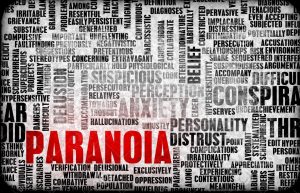 Paranoia is a state of mind where the individual believes that others are trying to harm them. They could be feeling like they are being watched, followed or monitored in some way. They may believe that there is some kind of conspiracy operating against them. Paranoid individuals sometimes have an increased sense of self-importance, believing that many are taking notice of them when it is not true.
Paranoia is a state of mind where the individual believes that others are trying to harm them. They could be feeling like they are being watched, followed or monitored in some way. They may believe that there is some kind of conspiracy operating against them. Paranoid individuals sometimes have an increased sense of self-importance, believing that many are taking notice of them when it is not true.
Many individuals feel paranoid at times for example “Is he/she looking at me strangely”?, “Is he/she talking about me behind my back”? and sometimes these feelings can even be justified. Mild paranoid thoughts are quite common in the general population and they tend to recover naturally. However, long-term paranoia can be a symptom of a mental disorder or be caused by recreational drug abuse, dementia or other medical conditions that affect the brain.
Paranoia is sometimes referred to as a persecutory delusion. A delusion is a fixed, false belief that someone continues to believe even when there is no evidence that the belief is true. Paranoid symptoms can range from a general feeling of distrust and suspiciousness of others through to bizarre and complicated beliefs such as conspiracy theories about the government, police or aliens.
Mental disorders that cause paranoia include:
• Paranoid personality disorder
A personality disorder is a long-standing pattern of problematic thoughts, feelings and behaviour. Individuals with paranoid personality disorder have a tendency to assume that others will harm, deceive or take advantage of them. They may appear secretive, argumentative or cold and be difficult to get along with. This disorder is uncommon and usually, improves with age so that many people recover by their 40s or 50s.
• Delusional disorder
Individuals with a delusional disorder have one fixed and false belief delusion without any other symptoms of mental illness. Paranoid delusions are the most common, but individuals with a delusional disorder can also have other types of unusual beliefs.
• Paranoid schizophrenia
Schizophrenia is a form of psychosis and causes individuals to have trouble interpreting reality. The main symptoms are hallucinations (such as hearing voices that aren’t there) and delusions (fixed, false beliefs). Some individuals with schizophrenia have bizarre delusions such as believing that their thoughts are being broadcast over the radio or they are being persecuted by the government . Other symptoms include confused thinking and reduced motivation for everyday tasks.
Other causes include recreational drug use, neurological disease, and severe trauma and stress.
If you have any questions or would like to make an appointment, please contact us on 8448 1106.
